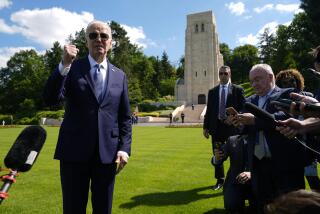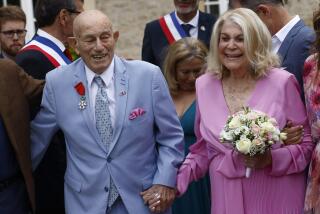Old and Young, Bravo
- Share via
The 9,387 white marble crosses and Stars of David in the magnificent U.S. cemetery on bluffs overlooking Omaha Beach detail the sacrifice that began on June 6, 1944, a Tuesday known as D-day. The sheer cliffs of Pointe du Hoc spell out why so many died on French shores trying to climb through a storm of bullets and assault the German guns.
The names of the D-day warriors still resound: Eisenhower and Montgomery, Bradley and Rommel. But oral histories compiled in later years quote men with stripes on their sleeves rather than stars on their shoulders. Those privates, corporals and sergeants tell of soldiers fighting next to strangers because they were landed in the wrong place and dying before they could speak their names. Numerous crosses mark the final resting places of soldiers “known but to God.”
The Canadian, British and U.S. and other soldiers who died on French beaches code-named Sword, Juno, Gold, Omaha and Utah 60 years ago Sunday numbered in the thousands. But 150,000 made it ashore and marched on to liberate France and defeat Nazi Germany. Success was not certain: Gen. Dwight D. Eisenhower scrawled a press release saying “our landings ... have failed to gain a satisfactory foothold,” necessitating retreat. Fortunately he was able to scrap the announcement, which concluded, “If any blame or fault attends to the attempt it is mine alone.”
President Bush and President Jacques Chirac of France should find it easy to make common cause this weekend in commemorating a war that all thought necessary. The French, like most other Europeans, opposed the invasion of Iraq and have disputed other U.S. policies in recent decades. But mention Normandy and the French smile and give thanks, perhaps with the reminder they supported the U.S. war of independence and thus rank as this country’s oldest ally.
Signs of destruction are still scattered among Normandy’s dairy and apple farms and houses hidden behind stone walls. The half-wrecked former church of St. Etienne the Old in Caen, heavily damaged in the bombing before and after D-day, offers especially moving testimony.
The soldiers sent to fight at age 20 are 80 now; this will be the last major ceremony to include those veterans in any large numbers. Cities across Normandy plan to honor those who return. At the Port of Los Angeles, the French Consulate is hosting a ceremony for veterans.
As with last weekend’s ceremonies dedicating the World War II memorial in Washington, the D-day observances will produce tears, speeches and fitting tributes to the warriors of “the greatest generation” who went to fight the “good war.”
Their descendants are the volunteers who fight today in Iraq and Afghanistan. Those who honor the veterans this weekend should include praise for fighters for a cause less clear with an outcome still uncertain.
More to Read
Sign up for Essential California
The most important California stories and recommendations in your inbox every morning.
You may occasionally receive promotional content from the Los Angeles Times.













